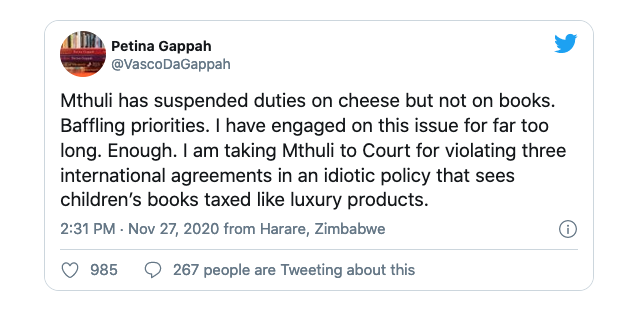
Author Gappah Petina (Marina Cavazza / Farrar, Straus and Giroux / LA Times)
Prominent Zimbabwean trade lawyer and writer, Pettina Gappah, has threatened to take Zimbabwe’s Finance Minister, Mthuli Ncube, to court over government refusal to remove import duties on certain books.
Gappah (@VascoDaGappah) recently made these sentiments public on Twitter were she wrote…
Mthuli has suspended duties on cheese but not on books. Baffling priorities. I have engaged on this issue for far too long. Enough. I am taking Mthuli to Court for violating three international agreements in an idiotic policy that sees children’s books taxed like luxury products.

Ms Gappah’s apparent frustration with a long lingering government policy seems to have been reignited by public discourse around the recently presented 2021 National Budget by the Finance Minister. The actual suspension of duty on raw cheese came into effect through Statutory Instrument (SI) 184 of 2020 gazetted in July 2020. The SI is due to expire, unless renewed, at the end of December 2020.
Gappah is disappointed that the Minister chose to suspend “duties on cheese but not on books” and that the government is treating “children’s books like luxury products” by maintaining duties on this class of imports.
An avid reader and acclaimed international writer who has won international awards, Gappah is also an experienced insider when it comes to international trade law having worked for the WTO.
As far as we know, the government has not said why this policy remains in place despite apparent international commitments. At the time of writing this article, Mr Mthuli Ncube had not responded to the threat by Gappah.
An example of such an international treaty as referred to by Gappah the government may be contravening is the Agreement on the Importation of Educational, Scientific and Cultural Materials under UNESCO. Article 1 of the agreement says state parties to the agreement undertake not to apply customs duties on certain “books, publications and documents“.
Zimbabwe filed Notification of succession in 1998 and is thus legally bound by the provisions of the treaty.
In her subsequent tweets, Gappah worried that the continued customs duties on books on entering Zimbabwe threatened to produce an illiterate generation in the country. She also said local industry protection could not be a reason for maintaining the duties as there was no local industry to protect and “books are not always substitutable“.
Ms Gappah’s tweet generated much debate on the issue with many commenters in support of her cause.